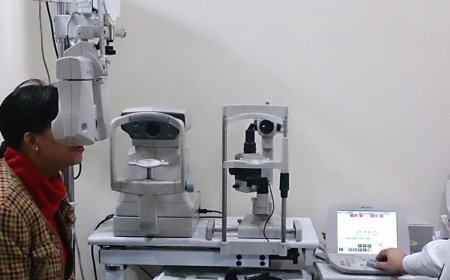Common Conditions Treated in the Pediatric ICU?
A specialist section of the hospital, the Pediatric Intensive Care Unit (PICU) is devoted to giving critically sick children the best possible medical care.
The Pediatric Intensive Care Unit (PICU) is a specialized area of the hospital dedicated to providing the highest level of medical care to critically ill children. These units are staffed with highly trained healthcare professionals who use advanced technology to monitor and treat a variety of severe and complex conditions. Below, we explore the common conditions treated in the PICU in greater detail. Reach out to Pediatric Cardiac Critical Care In Coimbatore.
1. Respiratory Distress and Failure
Conditions:
-
Severe Asthma: Asthma attacks can range from mild to severe. In some cases, children experience asthmaticus, where conventional treatments like inhalers and nebulizers fail to alleviate symptoms. In the PICU, these children might receive continuous nebulization, intravenous steroids, and sometimes mechanical ventilation to maintain adequate oxygen levels.
-
Bronchiolitis: Often caused by respiratory syncytial virus (RSV), bronchiolitis leads to inflammation and congestion in the small airways of the lungs. In severe cases, children require oxygen therapy, continuous positive airway pressure (CPAP), or mechanical ventilation.
-
Pneumonia: Severe cases of bacterial or viral pneumonia can cause significant lung inflammation and fluid buildup, impairing oxygen exchange. Treatments include antibiotics, antiviral medications, and supportive care such as mechanical ventilation.
-
Acute Respiratory Distress Syndrome (ARDS): ARDS is a life-threatening condition characterized by widespread inflammation in the lungs, leading to fluid leakage into the air sacs. Treatment involves mechanical ventilation with careful management of oxygen and ventilation settings to minimize further lung injury.
Care in the PICU:
-
Mechanical Ventilation: Children with respiratory failure may need mechanical ventilation, which involves a machine that assists or takes over the work of breathing. Ventilators are carefully adjusted to provide the right balance of oxygen and carbon dioxide exchange.
-
Non-Invasive Ventilation: Techniques like CPAP or BiPAP can help maintain airway pressure and improve oxygenation without the need for intubation.
-
Oxygen Therapy: High-flow oxygen or other specialized delivery methods are used to ensure the child receives sufficient oxygen.
2. Severe Infections
Conditions:
-
Sepsis: Sepsis is a life-threatening response to infection that can lead to organ failure and shock. Early recognition and prompt treatment with antibiotics, fluid resuscitation, and organ support are crucial.
-
Meningitis: Inflammation of the protective membranes covering the brain and spinal cord, often caused by bacterial or viral infections. Bacterial meningitis requires prompt antibiotic therapy, while viral meningitis is usually managed with supportive care.
-
Severe Pneumonia: This can lead to sepsis or respiratory failure, requiring intensive care for management.
Care in the PICU:
-
Intravenous Antibiotics/Antivirals: Prompt administration of broad-spectrum antibiotics or antivirals to combat infection. The choice of medication is guided by the suspected or confirmed pathogen.
-
Maintaining blood pressure and organ perfusion is the goal of fluid resuscitation. This often involves giving intravenous fluids and medications to support cardiovascular function.
-
Organ Support: Such as dialysis for kidney failure or medications to support heart function. Continuous monitoring of vital signs and laboratory parameters helps guide therapy.
3. Trauma
Types of Trauma:
-
Head Trauma: This includes concussions, skull fractures, or intracranial hemorrhage. Children with severe head injuries require careful neurological monitoring and sometimes surgical intervention to relieve pressure on the brain.
-
Blunt or Penetrating Injuries: These can result from accidents, falls, or violence, leading to internal organ damage or significant fractures. Stabilization, surgical repair, and intensive monitoring are often needed.
-
Burns: Severe burns that affect large body areas or involve critical functions such as breathing require specialized care. Treatment includes pain management, wound care, and prevention of infection.
Care in the PICU:
-
Neurological Monitoring: Continuous monitoring for signs of increased intracranial pressure or neurological deterioration. This may involve using intracranial pressure monitors or frequent neurological assessments.
-
Surgical Interventions: Emergency surgeries to address internal injuries or stabilize fractures. The PICU team works closely with surgeons to manage post-operative care.
-
Pain Management and Sedation: To keep the child comfortable and manage pain, often using a combination of medications tailored to the child's needs.
4. Congenital Heart Defects
Conditions:
-
Hypoplastic Left Heart Syndrome (HLHS): A condition where the left side of the heart is underdeveloped, requiring multiple surgeries and intensive post-operative care.
-
Tetralogy of Fallot: A combination of four heart defects that affect normal blood flow, often requiring surgical correction and intensive monitoring.
-
Transposition of the Great Arteries: Where the two main arteries leaving the heart are reversed, requiring immediate surgical intervention after birth.
Care in the PICU:
-
Pre- and Post-Operative Monitoring: Close monitoring before and after heart surgeries to detect and manage any complications.
-
Extracorporeal Membrane Oxygenation (ECMO): Provides cardiac and respiratory support when the heart and lungs are severely compromised. ECMO is used as a bridge to recovery or further treatment.
-
Medications: To support heart function, manage fluid balance, and prevent complications such as arrhythmias or heart failure.
5. Neurological Disorders
Conditions:
-
Traumatic Brain Injury (TBI): Caused by accidents, falls, or other impacts. Management includes preventing secondary brain injury, monitoring intracranial pressure, and ensuring adequate oxygenation and perfusion.
-
Seizures: Particularly status epilepticus, where seizures are prolonged or frequent. Treatment includes anticonvulsants, sedation, and continuous EEG monitoring.
-
Encephalitis: Inflammation of the brain, often due to infection. Management includes antiviral or antibiotic therapy, anti-inflammatory medications, and supportive care.
Care in the PICU:
-
Continuous EEG Monitoring: To monitor brain activity and detect seizures. This allows for timely intervention to control seizures and minimize brain injury.
-
Intracranial Pressure Monitoring: To detect and manage increased pressure within the skull. Interventions may include medications, surgical drainage, or other techniques to relieve pressure.
-
Anticonvulsants and Sedatives: To control seizures and ensure patient comfort. Medication regimens are carefully tailored to each child's needs.
6. Post-Surgical Care
Types of Surgeries:
-
Organ Transplants: Liver, kidney, or heart transplants. The PICU team manages the immediate post-operative period, monitoring for rejection, infection, and other complications.
-
Spinal Surgeries: For conditions like scoliosis or spinal trauma. Post-operative care includes pain management, monitoring for complications, and early mobilization.
-
Complex Orthopedic Procedures: Such as those for severe fractures or congenital deformities. Care includes pain management, wound care, and rehabilitation support.
Care in the PICU:
-
Pain Management: Using a combination of medications and techniques to control post-operative pain. This may involve patient-controlled analgesia (PCA), epidurals, or other methods.
-
Monitoring for Complications: Such as infection, bleeding, or organ rejection. The PICU team conducts frequent assessments and lab tests to detect and address complications early.
-
Rehabilitation Support: Early mobilization and physical therapy to aid recovery. The PICU team works with rehabilitation specialists to plan and initiate appropriate therapies.
7. Metabolic and Genetic Disorders
Conditions:
-
Diabetic Ketoacidosis (DKA): A serious complication of diabetes characterized by high blood sugar and ketone levels. Treatment involves insulin therapy, fluid replacement, and electrolyte management.
-
Inborn Errors of Metabolism: Such as urea cycle disorders or phenylketonuria (PKU). These conditions require specialized management to correct metabolic imbalances and prevent complications.
Care in the PICU:
-
Insulin Therapy: For managing blood sugar levels in DKA. The PICU team closely monitors blood glucose and ketone levels, adjusting insulin dosages as needed.
-
Metabolic Correction: Administration of specific nutrients or medications to correct metabolic imbalances. This may involve dietary modifications, enzyme replacement therapy, or other interventions.
-
Continuous Monitoring: To track vital signs, blood gasses, and metabolic parameters. Frequent assessments guide treatment decisions and help prevent complications.
8. Oncology Complications
Conditions:
-
Febrile Neutropenia: A dangerous drop in white blood cells combined with fever, often seen in chemotherapy patients. Treatment includes antibiotics, antifungals, and supportive care to prevent and treat infections.
-
Tumor Lysis Syndrome: A potentially life-threatening condition caused by the rapid release of cellular contents from dying cancer cells. Management involves aggressive hydration, medications to lower uric acid levels, and close monitoring.
-
Severe Side Effects of Chemotherapy: Including organ toxicity, severe infections, or metabolic imbalances. The PICU team provides supportive care to manage these side effects and maintain organ function.
Care in the PICU:
-
Infection Control: Strict protocols to prevent and treat infections. This includes isolation measures, use of antibiotics, and monitoring for signs of infection.
-
Electrolyte Management: Monitoring and correcting electrolyte imbalances. This involves frequent blood tests and administration of fluids and electrolytes as needed.
-
Supportive Therapies: Including blood transfusions, nutritional support, and medications to support organ function and manage symptoms.
Conclusion
The Pediatric Intensive Care Unit is a critical component of pediatric healthcare, providing lifesaving care for children with severe and complex medical conditions. The multidisciplinary team of healthcare professionals in the Pediatric Intensive Care In Coimbatore is dedicated to providing comprehensive care, utilizing advanced medical technologies and treatments to improve outcomes and support the recovery of their young patients.
What's Your Reaction?















![Noots Focus Reviews [Truth Exposed 2025]!](https://news.bangboxonline.com/uploads/images/202501/image_430x256_678e3b94881a1.jpg)
![Vivalis Male Enhancement: The Must-Know Ingredients [2025 Update]](https://news.bangboxonline.com/uploads/images/202501/image_430x256_678e3b54e396c.jpg)










